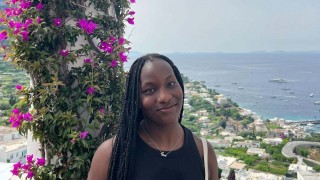There are few things more satisfying and reassuring than grappling with the challenges of study abroad and emerging victorious.
Studying abroad was something I planned on doing since I was old enough to grasp the concept. As a child growing up, my mom would tell fantastic stories from her year abroad, citing it as one of the most amazing experiences of her college career. She encouraged me to pursue study abroad in college, and it soon became a sort of lofty ideal that college could not be complete without. I couldn’t wait; in high school, I spent a month abroad in Barcelona and loved every minute of it. This experience only made me more excited about studying abroad in college, and when the opportunity to spend a summer in Berlin studying Art and Music Humanities came along, I jumped on it.
However, upon arriving in Berlin, the experience was not what I expected. This was not a place like any other I had ever visited. Coming from a background based in romance language and culture, Germany could not have been further removed from my previous experiences. The language, cultural norms, even the food were foreign. This was my first real experience with “culture shock,” and I felt overwhelmed and frustrated. How could I, someone who prided myself on my outgoing, adventurous nature, love of travel, and ability to easily acclimate abroad, feel so out of place? Outside of my comfort zone, I initially had trouble engaging fully with the program and study abroad experience. I spent afternoons in my room, hiding away from the unfamiliar sights and smells, the harsh noises novel to my ears. I felt guilty and ashamed of myself: how could I squander such an incredible opportunity? Study abroad was supposed to be this amazing, transformative experience; so why wasn’t it for me?
It was only once I let go of my expectations of myself, of study abroad, and of Berlin, that I could begin to thrive abroad. My own preconceived notions were like a barrier holding me back from experiencing everything authentically. After a week of kicking myself for “wasting” my time abroad, I finally made the push to let go and begin exploring. I started small, walking around the neighborhood of Kreuzberg where we were staying. I delighted in my discoveries, from a small coffee shop with the best German pastry of cinnamon and almond paste I had ever tasted, to a massive thrift store with every item of clothing imaginable, to a small record shop that hosted underground concerts, keeping the Berlin tradition of counter-culture very much alive. I pushed further, drinking in the vibrant nightlife and beautiful street art, sampling the amazing spread of museums and the best kebab on the planet (sorry NYC halal carts; you’ve met your match). I fell in love with Tempelhof, the old abandoned airport turned park. A short bike ride away from where we were staying, it became the sight of many picnics in the golden glow of the late afternoon, of casual soccer games in the lazily swaying grass, and of quiet, contemplative bike rides around the tarmac. The development of part of the park into refugee housing paid subtle tribute to its use in the Berlin Airlift, quietly reminding of the rich, complicated history of the city. Berlin, once cold and intimidating, began to feel comfortable and familiar as I discovered the gems that made it a home.
I now look back on my summer abroad fondly; the memories I made, relationships I forged, and places that grew dear to me will forever be with me. However, it was by no means an easy experience, and I think it’s important to note that not only is that ok, but that this difficulty can be quite a good thing. When study abroad is talked about, we often hear adjectives like amazing, life changing, and transformative; we rarely hear of the discomforts, the challenges, or the hardships. I think this sugarcoating does study abroad and its students a disservice: study abroad can be tough, but that is exactly WHY it can be so powerful. Initial discomfort presents the opportunity to overcome it; stepping outside your comfort zone gives you the chance to find your place. There are few things more satisfying and reassuring than grappling with the challenges of study abroad and emerging victorious. This sort of difficulty fosters growth, and I am grateful for the difficulties I had because they forced me to let go of my preconceived notion of “the perfect study abroad” and instead create an experience that worked for me. To those considering studying abroad, I recommend you go for it with an open mind and enthusiastic heart: you may be surprised what you find, and all that you can get out of it.
